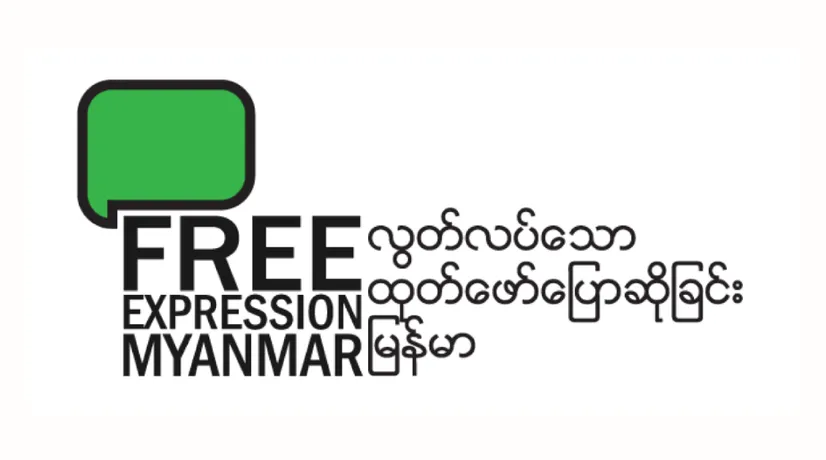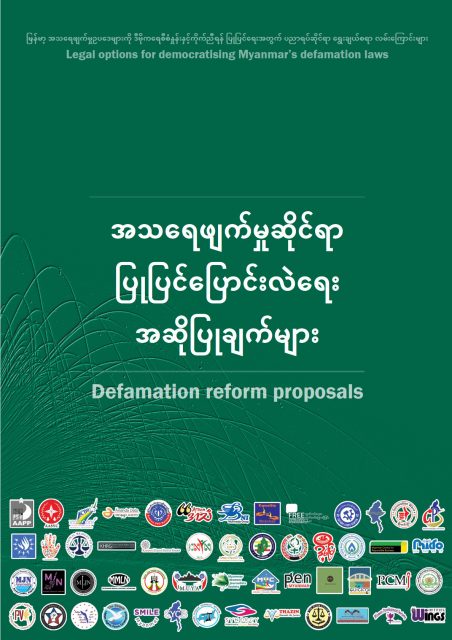Defamation Reform Proposals – အသရေဖျက်မှုဆိုင်ရာ ပြုပြင်ပြောင်းလဲရေး အဆိုပြုချက်များ
10 December 2020


Legal options for democratising Myanmar’s defamation laws
This report is the third in a series on defamation. The first showed how defamation laws are being misused in Myanmar. The second explained the international democratic standards that Myanmar should be aiming for. This third report outlines how other similar countries reformed their laws and proposes options that the Myanmar government could take.
Myanmar is not the first country to start a transition to democracy. It follows many others, most of which have found that reforming defamation laws was a critical first step to democracy.
In Sri Lanka and the Maldives, new democratic governments used defamation reform as their signature policy to highlight their difference from their authoritarian predecessors. In the UK and India, defamation reform was a recognition of the development of democratic standards and the need to address injustices.
The Myanmar government could learn from all. Myanmar is still at the beginning of its transition and the 2020 elections in particular are an excellent opportunity for the government to lay out its plans for the coming years.
—————————
မြန်မာ့ အသရေဖျက်မှုဥပဒေများကို ဒီမိုကရေစီစံနှုန်းနှင့်ကိုက်ညီရန် ပြုပြင်ရေးအတွက် ပညာရပ်ဆိုင်ရာ ရွေးချယ်စရာ လမ်းကြောင်းများ
ဤအစီရင်ခံစာသည် အသရေဖျက်မှုနှင့်ပတ်သက်သော ထုတ်ဝေသော စာစဥ်များတွင် တတိယမြောက် အစီရင်ခံစာဖြစ်သည်။ ပထမတစ်အုပ်တွင် အသရေဖျက်မှုဥပဒေများကို မြန်မာနိုင်ငံ၌ မည်သို့ တလွဲအသုံးပြုနေသည်ကို ရေးသားခဲ့ပြီး ဒုတိယတစ်အုပ်တွင် မြန်မာနိုင်ငံအနေဖြင့် ရှေးရှုသင့်သည့် နိုင်ငံတကာ ဒီမိုကရေစီစံနှုန်းများ အကြောင်းကို ရှင်းလင်းဖော်ပြခဲ့သည်။ ဤတတိယစာအုပ်၌ မြန်မာနိုင်ငံနှင့် အလားတူနိုင်ငံများတွင် မည်သို့ ဥပဒေပြုပြင်ပြောင်းလဲမှု လုပ်ဆောင်ခဲ့ပုံကို အနှစ်ချုပ်တင်ပြထားပြီး မြန်မာအစိုးရ လုပ်ဆောင်နိုင်သည့် ရွေးချယ်စရာလမ်းကြောင်းများကိုလည်း အဆိုပြုထားသည်။
မြန်မာနိုင်ငံသည် ဒီမိုကရေစီအသွင်စတင် ကူးပြောင်းသည့် ပထမဆုံးသော နိုင်ငံမဟုတ်ဘဲ အခြားနိုင်ငံများ၏ လမ်းစဥ်ကို နောက်မှလိုက်နေရသော နိုင်ငံဖြစ်သည်။ အသရေဖျက်မှုဥပဒေများကို ပြုပြင်ပြောင်းလဲခြင်းသည် ဒီမိုကရေစီအတွက် အရေးကြီးသော ခြေလှမ်းတစ်ရပ်ဖြစ်သည်ကို နိုင်ငံအများစု၌ တွေ့မြင်ခဲ့ရပြီး ဖြစ်သည်။
သီရိလင်္ကာနှင့် မော်လ်ဒိုက်နိုင်ငံများတွင် ဒီမိုကရေစီအစိုးရသစ်များသည် အသရေဖျက်မှုနှင့်ပတ်သက်၍ ပြုပြင် ပြောင်းလဲမှုများကို ၎င်းတို့၏ အများပြည်သူပါဝင်မှုဖြင့် လှုပ်ရှားလုပ်ဆောင်သည့် signature policy များသဖွယ် အသုံးပြုကာ ယခင့်ယခင် အာဏာရှင်များနှင့် မတူကြောင်းကို ထုတ်ဖော်ပြသခဲ့ကြသလို ယူကေနှင့် အိန္ဒိယတွင်လည်း အသရေဖျက်မှုဆိုင်ရာ ပြုပြင်ပြောင်းလဲမှုသည် ဒီမိုကရေစီစံနှုန်းများ တိုးတက်မြင့်မားလာမှုကို အသိအမှတ်ပြုခြင်းဖြစ်ပြီး တရားမမျှတမှုကို ဖြေရှင်းနိုင်ရန် မဖြစ်မနေလိုအပ်သော အချက်တစ်ခု ဖြစ်ခဲ့သည်။
မြန်မာအစိုးရအနေဖြင့် နိုင်ငံအားလုံးထံမှ သင်ခန်းစာယူ လေ့လာနိုင်ပါသည်။ မြန်မာနိုင်ငံသည် အသွင်ကူးပြောင်းခါစ အနေအထားတွင်သာ ရှိနေပြီး ၂၀၂၀ ရွေးကောက်ပွဲသည် အစိုးရအတွက် လာမည့်နှစ်များအတွင်း ၎င်းတို့၏ အစီအစဥ်များကို ပြင်ဆင်ပြသနိုင်မည့် အကောင်းဆုံး အခွင့်အလမ်းတစ်ခုပင် ဖြစ်သည်။
Announcements
28 February 2025
Asian NGO Network on National Human Rights Institutions , CSO Working Group on Independent National Human Rights Institution (Burma/Myanmar)
Open letter: Removal of the membership of the dis-accredited Myanmar National Human Rights Commission from the Southeast Asia National Human Rights Institution Forum

Progressive Voice is a participatory rights-based policy research and advocacy organization rooted in civil society, that maintains strong networks and relationships with grassroots organizations and community-based organizations throughout Myanmar. It acts as a bridge to the international community and international policymakers by amplifying voices from the ground, and advocating for a rights-based policy narrative.